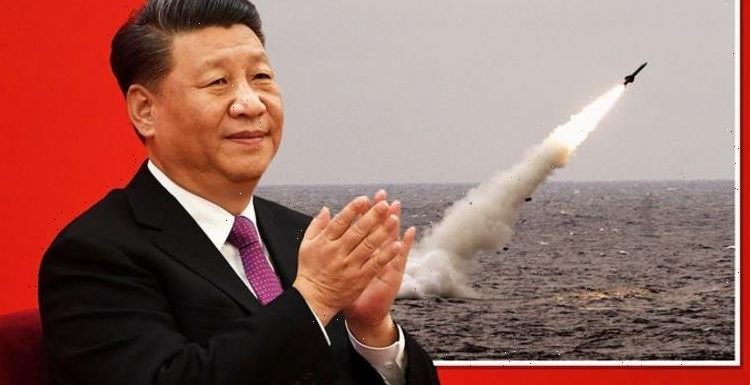
China 'taunting Taiwan' with Afghanistan crisis says expert
We use your sign-up to provide content in ways you’ve consented to and to improve our understanding of you. This may include adverts from us and 3rd parties based on our understanding. You can unsubscribe at any time. More info
The world’s most powerful wind tunnel has been constructed in China, with the ability to hit speeds of 23,000mph. The groundbreaking JF-22 facility in Beijing’s Huairou district puts China decades ahead of the competition in the field of hypersonic tech research. According to Han Guilai, a researcher at the Chinese Academy of Sciences, the facility gives China a 20 to 30 year lead on the West.
Both the US and Russia are in the midst of a race to develop hypersonic missiles capable of deploying warheads with pinpoint precisions.
These devastating weapons of mass destruction would fly into space at speeds many times the speed of sound before raining death and destruction upon their targets.
China has joined the race with its newest wind tunnel facility, developing the ability to test aircraft from the bleeding edge of hypersonic research.
According to reports in South China Morning Post, the facility can whip up wind speeds of up Mach 30 – 30 times the speed of sound.


To put that into perspective, the Concorde only hit speeds of about Mach 2 or 1,350mph on a transatlantic flight from London to New York.
The Chinese wind tunnel uses chemical explosions to produce a stream of high-speed wind, rather than mechanical compressors.
The stream, in turn, generates powerful shockwaves and pressures comparable to the extremities experienced by missiles and other high-speed weaponry.
Professor Han compared flying in such conditions to swimming in mud.
When aircraft reach supersonic speeds, their surfaces can reach temperatures of 10,000C (18,032F).
At such temperatures, the bonds holding molecules of air together begin to break.
Professor Han said: “This air is no longer the air we breathe in.
Bill Hayton discusses economic impact of South China Sea tensions
“The flying vehicle we study is like swimming in mud.”
The world’s biggest wind tunnel is presently found in Mountain View, California.
However, that facility is not capable of simulating supersonic wind speeds.
Instead, America’s most powerful research facility is found just outside Buffalo, New York.
The facility is known as the Large Energy National Shock tunnels (LENS) and is used by NASA to test rocket and spacecraft designs.
According to Professor Han, China’s new facility has a power output of about 15 gigawatts – about 70 percent of the world’s biggest hydroelectric dam, the Three Gorges Dam in Sichuan province.
Chinese officials have claimed the new facility is not intended for testing weapons.
DON’T MISS…
China’s silent takeover of NHS is a ‘national security issue’ [INSIGHT]
As UK and US abandon Afghanistan China eyes the spoils [COMMENT]
China and Russia tipped for terrifying alliance amid Afghan chaos [REPORT]


Instead, Jiang Zonglin, head of the project, told China Central Television the JF-22 wind tunnel will focus on the country’s “space aircraft system”.
China has been ramping up its operations in low-Earth orbit and beyond, with a recently launched crewed space station and missions to the Moon and Mars.
But the country has also been pursuing supersonic-grade technology for some time now.
In 2018, Mike Griffin, the undersecretary for research and engineering at the US Department of Defense, warned China has already carried out 20 times more supersonic weapons tests than the US has in the last decade.
The technology is also being pursued by Russia, with Kremlin considering hypersonic weapons a “priority”.
President Vladimir Putin said last year: “While developing their anti-ballistic missile system, the Americans wanted to upset this strategic stability and balance thinking that if they created a missile defence umbrella, then the other side wouldn’t be able to respond adequately if they use nuclear weapons.
“However, after having developed these modern systems, including those which easily evade any anti-missile ballistic system, we maintain this strategic stability and strategic balance.
“It is essential not only for us, but also for global security.”
The development of supersonic rockets, for instance, could help cut down the time and cost of space travel.
Supersonic aircraft could also drastically cut the time spent on intercontinental flights.
NASA is presently working on experimental technology that could revolutionise supersonic flight with the “quiet” X59 jet.
Source: Read Full Article